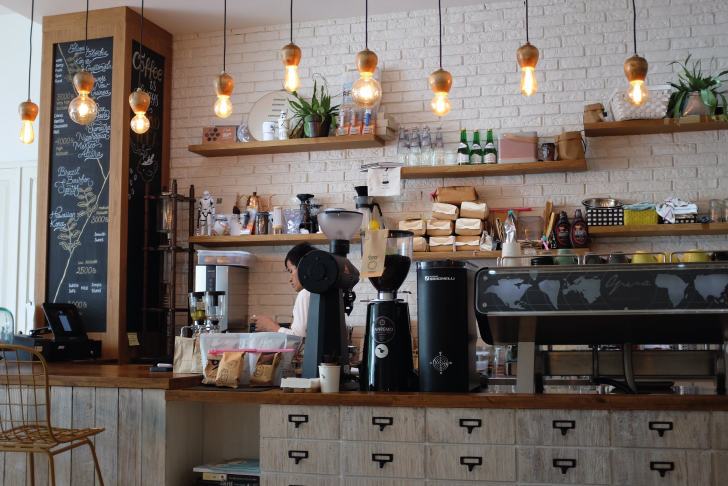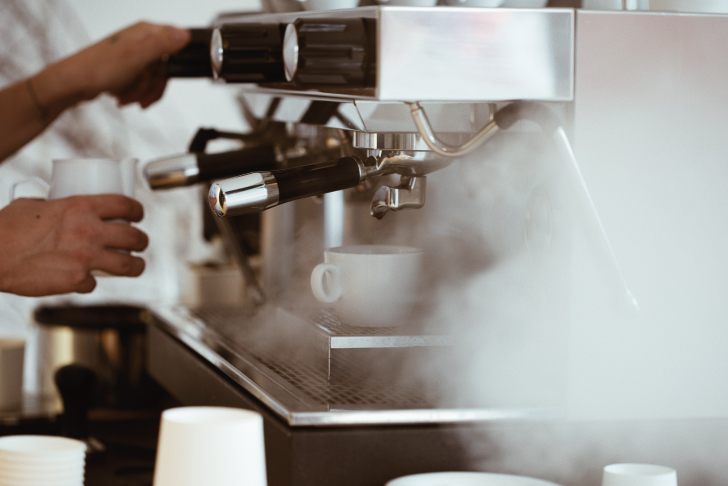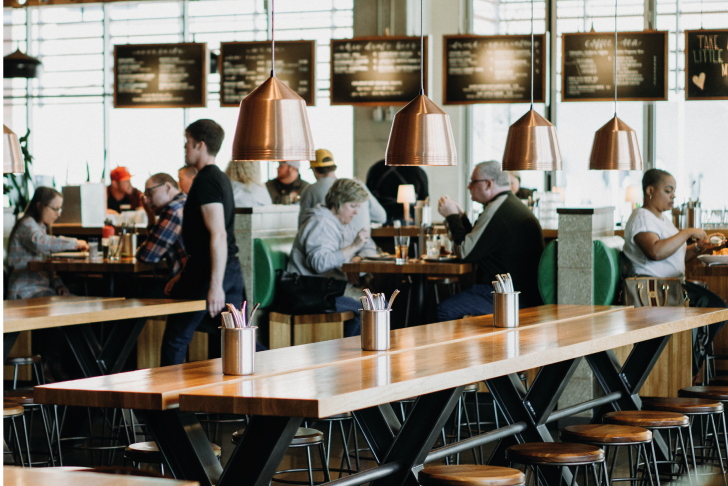The cafe industry is stable and has enjoyed steady growth in Australia over the last decade.
While the industry declined over the last few years due to Covid-19 and lockdowns, researchers expect 2022 to bring a 2.5% growth in market size. So as the market regains stability, it's an excellent time to start a coffee shop in Australia.
However, the café industry has a low barrier to entry, meaning fierce competition in the marketplace.
So, you need a solid niche, industry knowledge, and excellent planning and marketing skills to give yourself the best chance of success.
If you don't have all these ingredients yet, that's perfectly okay. This guide will cover the important steps to opening a coffee shop, including setting up your store and marketing it to get your first customers.
Setting Up Your Coffee Shop

When you consider everything you need to start a coffee shop, it can seem pretty daunting.
To make it easier, here are the most important factors:
What is your niche?
Australia's coffee shop industry is 95% independently owned, making it highly competitive. So, you must have a niche and unique selling proposition to stand out.
Here's how to develop your niche and USP:
1. Find an untapped demand in your area
Fulfilling an existing demand gives your café the best chance of succeeding, but it can be tricky to figure out what consumers need.
Here are some ways to research your market:
- Ask co-workers, friends, and family what type of store they'd like in the area.
- Find customer reviews of local cafés and reach out to ask about their experience and any improvements they'd like to see.
- Consider adjacent market trends, such as veganism or organic eating. If you see other stores catering to these niches, there's likely demand for a cafe.
2. Consider the experience you want customers to have
Do you want customers to feel at home with rustic style decor? What about creating a comfortable space for students and remote workers?
Some other ideas include:
- A family coffee shop with children's play areas.
- A warehouse-style cafe where customers can watch a coffee roaster in action.
- A coffee shop that turns into a bar with live music after dark.
Above all, ensure the experience you plan to provide is also what your potential customers want. For example, if you target vegan customers, you wouldn't use animal print decor in your decor.
3. Offer something unique
Adding something unique to your café doesn't have to be complicated, but it does have to be different to the other stores in your area.
It could be as simple as using specialty coffee, stocking the most types of coffee or offering certified organic products. Other options include your décor, amenities, and menu items.
These three factors combine to give you your niche. So, for example, you could create a Brisbane-based vegan-friendly café that doubles as a plant nursery.
From this niche, you develop your USP, which is a statement that encompasses what makes your business different. For the coffee shop above, their USP could be, "The cafe for people who care about animals and the environment." This statement is simple yet powerful because it resonates with the stores exact target market.
Do you need any training or industry knowledge?
Nothing is stopping you from opening a coffee shop without industry knowledge. But it'd be challenging to become a successful business owner that way. We recommend considering a few courses to improve your understanding:
- Barista training: Since coffee will be your main item, you must know how to make a good one. Barista courses are short, and you can complete them in a single weekend. Barista training courses are widely available in Australia.
- Marketing: Generating exposure for your coffee shop will play a significant part in your success. HubSpot academy offers many free courses on inbound marketing while Coursera’s social media marketing certificate is another option.
- Hospitality: Besides incredible coffee, running a successful coffee shop is also about excellent customer service and food safety. The Coffee School offers a hospitality package that covers various short courses. Alternatively, Tafe QLD provides accredited hospitality certificates. You can also study for a cert III in catering operations if you want to offer food at your cafe.
Where can you register your coffee shop?
Registering your coffee shop is simple, and you can do it online. Head to the Business Registration Service, select register your business and follow the prompts.
Here, you'll be able to apply for your free Australian Business Number (ABN) and complete several other registrations. These include registering your business for tax and choosing a business name.
Coffee shop start-up costs
While the exact cost to open your store will depend on its location, size, fit-out and other factors, these are some costs to expect:
Coffee shop equipment from Petra Group and Slimline Warehouse:
- Coffee machine: $3,800 - $10,000+
- Grinder: $1,600 - $2,500
- Accessories: $300 - $600 depending on quantity
- Dishwasher: $5,000 - $10,000 (serious machines can reach $30,000+)
- Cutlery: $1,500 - $2,000
- Blender: $500 - $2,000
- Fridge: $1,000 - $10,000
- Microwave: $800 - $5,000+
- Toaster: $500+
- Point of Sale (POS) equipment: $2,000 - $6,000+
- POS software: $0 - $2,000+ (per year)
- Display boards: - $200 - $1,400
- Furniture: $4,000 - $10,000+ (basic 20-table set up)
Staffing costs:
- Barista: $50 - $60k or $25 - $30 per hour.
- Cafe manager: $60 - $70k or $30 - $35 per hour.
- Bookkeeper: $60 - $75k or $30 - $35 per hour.
Miscellaneous costs:
- Cosmetic upgrades: $10,000 - $170,000 (varies highly depending on your needs).
- Licences and registrations: $1,000 - $3,000.
- Insurance: $900+ per year.
While your starting costs will vary, in general, the cost for opening a coffee shop is roughly:
- Low-end: $50,000 (Small, hole-in-the-wall cafe)
- Mid-tier: $225,000 for the first year
- High-end: $500,000 for the first year
Getting funding
Most cafes get their start thanks to some form of funding. Some of the most popular options include:
- Government grants: Governments often provide start-ups with grants so they can stimulate investment in the local area. We've got a dedicated Australian small business grant guide if you want to learn how to apply.
- Angel investors: While mostly applicable to tech companies, if you've got an angel investor in your network, they may be happy to help. In return, they may ask for equity in your business or treat it as a loan.
- Loans: Most cafes get funding from banks or other lenders. These days, it's also possible to secure online peer-to-peer loans. Our business loan guide dives into these further.
Whichever option you choose, you need to write a business plan before you apply. Without it, it's likely your applications won't get approved.
Here are some topics to include in your coffee shop business plan:
- Market assessment: This section should cover competitors, industry trends and details of your target market. When you understand these, you can make better decisions, and investors will be happy to give you money.
- Finances: Investors will want to know how they'll get their money back, so you'll need to show them sales projections and revenue estimates.
- Marketing: You don't need to cover the specifics of your marketing strategy, but investors will want to know your general plan for acquiring customers.
- About section: This brief section can cover background about you and your business. Write about your passion for coffee and share your business goals.
- Logistics: This section covers suppliers, inventory management and other operational details.
- Products: Write down the food, drinks, and items you plan to offer your customers.
Find out more: Need funding? Check out our guide on small business grants.
The Nuances of Starting Your Coffee Shop

Now that we've got the general details out the way, let's talk about specific aspects of starting your cafe.
Choosing a good location
Location will have a considerable impact on your success, so you must choose carefully before opening a cafe.
Here's what to consider:
- The demographic: Are there enough of your ideal customers in the local area? If there are other shops your perfect customer frequents, that answer is likely yes.
- Foot-traffic levels: When more people see your store, you have more chances to entice them in for a coffee or snack.
- The property: A property may have an excellent location, but there's more you should consider. Does the property need renovations to house a cafe? Is the property lease favourable? Who's responsible for repairs and maintenance? These are a few questions to consider.
- Neighbouring businesses: On one hand, businesses in the area can mean more customers and exposure for your cafe. However, certain companies will compete for your customers—for example, other cafes and food options.
- Accessibility: Your coffee shop should be easy to reach. If your customers drive, you need ample parking. But street visibility is vital if your customers are pedestrians, like in business districts.
In Australia, most cafes are located in business districts and shopping precincts.
Suppliers and quality control
Since you'll be using coffee and ingredients you don't manufacture, you must know how to pick an excellent supplier to ensure high quality beans.
Here's how to choose a supplier:
- Run a Google search for local suppliers. Reach out and ask about their processes and where they source their products from. Ask for product samples and testimonials from satisfied customers. Assess their customer service and openness during these interactions.
- Chat to cafe owners with locations far enough away from where you plan to open your store. When they know you won't be competing, they'll be happy to share their experiences.
- Consider any extras that a supplier may offer—for example, a free POS system, packages or training.
- If possible, visit their warehouse or factory so you can see their operation for yourself.
- Ask for their quality assurance processes. A reputable supplier will have QA certifications, such as ISO/TC 34/SC 15. They may also have guarantees or offer refunds for inferior goods.
- Look for a Fairtrade certified supplier, meaning they source sustainable and ethical beans. Fairtrade has a long list of accredited coffee brands across Australia and New Zealand.
- Consider other certifications, such as Australian Certified Organic or Swiss Water Processing.
Your team
Customer service is vital in delighting patrons and turning them into loyal brand advocates. Even if your coffee is top-notch, you won't have a successful coffee shop if customers aren't happy. So you must have an approachable team.
Some other qualities to look for include:
- Dedication
- Reliability
- Interpersonal skills
- Critical thinking
Legalities
Australia places strict standards on food businesses to ensure anything prepared in a store is safe to eat. You'll need to abide by five food safety regulations in Australia.
Here are some other potential legal requirements:
- Property requirements: Zoning, fire safety, occupation and compliance certificates.
- Business requirements: Food, alcohol, music, waste disposal and advertising licences.
- Food safety supervisors: At least one person at your cafe must be qualified.
- Course requirements: Staff need basic training in food safety consisting of online or classroom training, in-store manuals or in-house training.
Other legal issues include:
- Getting business insurance.
- Registering your business, tax and choosing a company name.
- Creating a Food Safety Plan.
Marketing Your Coffee Shop

While some customers may find your cafe by walking past, most will discover it through your marketing initiatives.
But before you start marketing, you need consistent branding that resonates with your target market.
Different demographics have different values, so you must first understand your customer. Think about their needs and wants, how much money they earn, their age and other influencing factors.
Once you know this information, you can create a memorable brand that your ideal customers love since it appeals to their preferences. And when you promote a consistent brand both in-store and online, customers are more likely to trust your company.
Here are some other marketing ideas:
- Customer incentives: Rewards programs are a staple in cafes. You can assign points for each dollar spent or offer free items after several purchases. Alternatively, you can offer limited-time, member-only discounts.
- Ask for social media reviews: User-generated content is a powerful social proof signal and boosts business exposure. Some may happen organically, but you can speed up the process by offering one-time discounts for customers who snap a picture in your store.
- Attend trade shows: These shows are an excellent way to meet other cafe owners, learn more about the hospitality industry and find suppliers. Some major hospitality trade shows include MICE, Fine Food Australia and Foodservice Australia. On Eventbrite, you'll also find many smaller events, such as roaster meet and greets.
- Social media: Aesthetic decor, coffee and food can get tons of exposure on social media, so setting up social profiles is a must. It also helps you build customer loyalty and gives you a direct line of communication that you can use for customer research.
Find out more: Need more advice on this sector? Read our sector-specific articles.
Did You Know that Starting a Coffee Shop Isn't Your Only Option?
If you want to own a coffee shop but don't want to go through the process of building a business from scratch, owning a franchise could be a better choice.
With franchising, you get access to a proven plug-and-play business system and support from the parent company. Sounds good? Then check out our coffee franchise opportunities.
Alternatively, you can buy an existing coffee shop. With this option, you get a proven business system that's currently generating money, meaning you can earn back your investment faster. If buying an existing business is more your style, you'll want to read our buying a business guide and browse coffee shops for sale on our site.
We also have an article on how to run a coffee business, so if you plan to buy an existing cafe, you can find more relevant information.
But regardless of which option you choose, we're always here if you need any support or guidance on your business journey. Send us questions through our feedback form, and one of our business experts will get back to you.
Good luck on your business journey, and don't forget to reach out if you need help!
